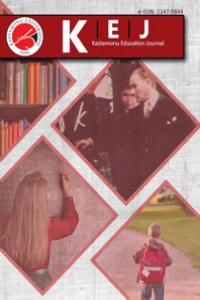Abstract
Dil becerileri anlama (okuma-dinleme) anlatma (yazma-konuşma) becerileri olarak ikiye ayrılmıştır. Bu temel beceri-lerden biri olan dinleme becerisi anlama becerileri içinde yer almaktadır. Dinleme yabancı dil öğreniminde diğer becerilere göre daha zor edinilen bir beceridir. Bu sebeple dinleme becerisini geliştirmeye yönelik etkinliklerin daha fazla kullanılması gerekmektedir. Bu çalışmanın amacı Türkçenin yabancı dil olarak öğretiminde Gazi Üniversi-tesi Yabancılara Türkçe Öğretimi Ders Kitabı B2 düzeyi dinleme etkinliklerinin içerik olarak incelenmesidir. Gazi Üniversitesi B2 seviyesinde toplam 20 metin incelenmiştir. Araştırmada dinleme metinlerinin sayısı, metinlerin konuları, etkinlik soru tipleri, dil bilgisel olarak düzeye uygunluğu, kullanılan kelimelerin seviyeye uygunluğu, me-tinlerin hız ve anlaşılırlığı, görsel kullanımı, görsel kullanılmış ise seviye ve konuya uyumu, ses dosyasındaki telaffuz ve metinlerin kültür aktarımı açısından uygunluğu Avrupa Dil Portfolyosu kriterlerine göre incelenmiştir. Çalışmada Gazi Üniversitesi Yabancılar İçin Türkçe B2 seviyesi ders kitabı dinleme metinleri nitel araştırma yönteminden do-küman incelemesi yöntemi kullanılarak incelenmiştir. Araştırma sonucunda dinleme bölümlerinde kültürel öğelere fazla yer verilmediği görülmüş olup kültürel öğelere daha fazla yer verilmesinin kültür aktarımını destekleyeceği düşünüldüğü için kültürel öğelere daha fazla yer verilmesi önerilmektedir. Ayrıca dinlemelerin bazılarında görsele hiç yer verilmezken bazılarında ise dinleme metni ile uyumlu olmayan görsele yer verildiği görülmüştür. Dinleme metinlerinde görsellere yer verilmesi ve metinlerin görsellerle uyumlu olmasının metnin anlaşılırlığını artıracağı düşünülmektedir bu sebeple görsele yer verilmeyen dinleme metinlerinde görsele yer verilmesi yer verilen görsel-lerin de metinle uyumu konusunda eksik kalındığı sonuçlarına ulaşılmıştır.
References
- [1] Aksan, D. (2009). Her Yönüyle Dil. Ana Çizgileriyle Dilbilimi I. Ankara: Türk Dil Kurumu Yayınları.
- [2] Barın, E.(2004). “Yabancılara Türkçe Öğretiminde İlkeler”, Türkiyat Araştırmaları Sayı 1, 22.
- [3] Baş, B. (2002). Türkçe Temel Dil Becerilerinin Öğretiminde Atasözlerinin Kullanımı. Pamukkale Üniversitesi Eğitim Fakültesi Dergisi(12), 60-68.
- [4] Büyükikiz, K. K. ve Hasırcı, S. (2013). Yabancı dil olarak Türkçenin öğretiminde sözcük öğretimi üzerine bir değerlendirme. Mustafa Kemal Üniversitesi Sosyal Bilimler Enstitüsü Dergisi, 10(21), 145-155.
- [5] Dilidüzgün, Ş. (2013). “Dinleme Eğitimi”. (Ed.: M. Durmuş, A. Okur), Yabancılara Türkçe Öğretimi El Kitabı, Ankara: Grafiker Yayınları, s.259-276.
Abstract
Language skills are grouped into two main categories namely comprehension (reading-listening) and speaking (writing- speaking) skills. The listening skill is one of the basic skills within the comprehension skill subcategory. Listening is a skill. Listening is a skill is more difficult skill than other the language skills to acquire during foreign language studies. For this reason, more activities should be carried out to improve listening skills. This study aims to examine the listening activities of the B2 level Teaching Turkish to Foreigners textbook authored by Gazi University, in terms of contents employed in teaching Turkish as a foreign language. Fort his purpoese a total of 20 texts were examined from the B2 level textbook of Gazi Univer- sity. The following were examined according to the criteria of European Language Portfolio: the number of listening texts; the topics of the texts; the types of questions in each activity; their suitability to the level of grammar; the compatibility of the vocabulary with the level; the speed and comprehensibility of the texts; the use of visuals; the compatibility of visuals with the level and their subjects if visuals were used; and the suitability of the pronunciation and texts in the audio file. In this study, the listening texts in the B2 level textbook prepared by Gazi University Turkish for foreigners were examined using the document analysis method from the qualitative research methodology. According to the results of the research, it has been observed that cultural topics are not included in the listening sections. This study recommends that that cultural topics should be included because cultural topics will support the transfer of culture. Additionally, no visuals were provided for some of the listening texts while other visuals were incompatible with the listening text. This study suggests that the inclu- sion of visualizations and their compatibility with listening texts will increase the comprehensibility of the text. Therefore, this study concludes that the visuals, which include the listening texts without visuals, are also incomplete.
References
- [1] Aksan, D. (2009). Her Yönüyle Dil. Ana Çizgileriyle Dilbilimi I. Ankara: Türk Dil Kurumu Yayınları.
- [2] Barın, E.(2004). “Yabancılara Türkçe Öğretiminde İlkeler”, Türkiyat Araştırmaları Sayı 1, 22.
- [3] Baş, B. (2002). Türkçe Temel Dil Becerilerinin Öğretiminde Atasözlerinin Kullanımı. Pamukkale Üniversitesi Eğitim Fakültesi Dergisi(12), 60-68.
- [4] Büyükikiz, K. K. ve Hasırcı, S. (2013). Yabancı dil olarak Türkçenin öğretiminde sözcük öğretimi üzerine bir değerlendirme. Mustafa Kemal Üniversitesi Sosyal Bilimler Enstitüsü Dergisi, 10(21), 145-155.
- [5] Dilidüzgün, Ş. (2013). “Dinleme Eğitimi”. (Ed.: M. Durmuş, A. Okur), Yabancılara Türkçe Öğretimi El Kitabı, Ankara: Grafiker Yayınları, s.259-276.
Details
| Primary Language | English |
|---|---|
| Subjects | Studies on Education |
| Journal Section | Research Article |
| Authors | |
| Publication Date | May 25, 2021 |
| Acceptance Date | October 1, 2020 |
| Published in Issue | Year 2021 Volume: 29 Issue: 2 |


